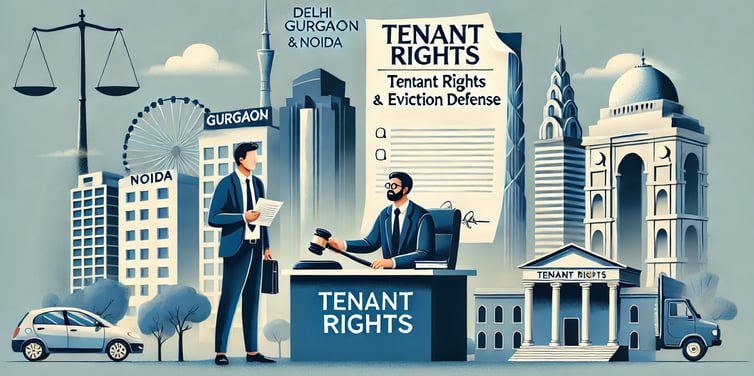Tenant Rights in NCR: How to Defend Against Eviction in Delhi, Gurgaon, Noida
Facing eviction in the NCR? Learn how tenants can defend against wrongful eviction, understand their rights, and navigate landlord-tenant laws in Delhi, Gurgaon, and Noida.
Archita
3/22/20254 min read


A house is made of walls and beams; a home is built with love and dreams. But what happens when the dream is threatened by eviction?
Did you know that nearly 35% of urban households in the NCR area live in rented accommodations, as per a one of the reports, With skyrocketing property prices in cities like Delhi, Gurgaon, Noida, and Faridabad, renting has become a practical choice for many. However, the landlord-tenant relationship isn’t always smooth sailing. Disputes over eviction are common, leaving tenants wondering: Can I defend myself if my landlord tries to evict me?
If you’re a tenant in the NCR, this article is your ultimate guide to understanding your rights, the legal grounds for eviction, and how you can protect yourself from wrongful eviction. Let’s dive in!
Introduction: The NCR Rental Scene
The NCR is a bustling hub of opportunities, attracting professionals, students, and families from across the country. With its thriving real estate market, renting is often the go-to option for many. However, the region’s rapid urbanization has also led to a rise in landlord-tenant disputes, particularly around eviction.
Eviction is a legal process where a landlord seeks to remove a tenant from the rented property. While landlords have certain rights, tenants are also protected under Indian law. The key is to know your rights and understand the legal framework governing rentals in the NCR. Whether you’re living in a high-rise in Gurgaon or a cozy apartment in Noida, this article will help you navigate the complexities of eviction laws.
Grounds for Eviction: When Can a Landlord Evict You?
In the NCR, landlords can’t just ask you to leave without valid reasons. Here are the common grounds on which a landlord can legally evict a tenant:
1. Non-Payment of Rent
If you fail to pay rent for a significant period (usually 2-3 months), your landlord can serve you a legal notice demanding payment.
If you don’t clear the dues within the notice period, the landlord can file an eviction suit in court.
2. Expiry of Lease Agreement
If your lease agreement has a fixed term and you continue to stay after it expires, the landlord can seek eviction.
However, they must provide a proper notice period as per the agreement or local tenancy laws.
3. Personal Use by the Landlord
Landlords can evict tenants if they need the property for personal use or for their family members.
They must prove that the requirement is genuine (bona fide) and not just an excuse to evict you.
4. Illegal Activities on the Premises
If you’re involved in illegal activities (like running an unauthorized business or criminal activities), the landlord can evict you.
They’ll need to provide evidence, such as a police complaint, to support their case.
How Can You Defend Against Eviction?
As a tenant, you have legal rights to defend yourself against wrongful eviction. Here’s how:
1. Prove Timely Rent Payments
If the eviction is based on non-payment of rent, you can defend yourself by providing rent receipts or bank transaction records.
Always maintain proper documentation of rent payments to avoid disputes.
2. Show a Valid Lease Agreement
If your lease agreement is still valid, you can argue that the landlord has no grounds for eviction.
Check if your agreement includes a renewal clause, which can help you extend your tenancy.
3. Challenge Insufficient Notice
Landlords must provide a proper notice period (usually 30-90 days) before filing an eviction suit.
If the notice is too short or not served correctly, you can challenge it in court.
4. Dispute Bona Fide Requirement
If the landlord claims they need the property for personal use, you can challenge the genuineness of their claim.
For example, if they already own multiple properties, you can argue that they don’t need this one.
Legal Framework for Tenants in the NCR
The NCR follows a mix of central and state-specific tenancy laws. Here’s what you need to know:
1. Delhi Rent Control Act, 1958
This law protects tenants in Delhi by limiting the grounds for eviction and controlling rent increases.
However, it applies only to properties with a monthly rent of up to ₹3,500 (a outdated threshold that often leads to disputes).
2. Haryana Rent Control Act, 1973
In Gurgaon and Faridabad, this law governs landlord-tenant relationships.
It provides similar protections but has its own set of rules and limitations.
3. Uttar Pradesh Urban Buildings Act, 1972
For Noida and Greater Noida, this law applies.
It allows landlords to evict tenants for specific reasons but also protects tenants from arbitrary eviction.
What to Do If You Receive an Eviction Notice?
Facing an eviction notice can be stressful, but here’s a step-by-step guide to handle it:
Read the Notice Carefully: Understand the grounds for eviction and the timeline provided.
Seek Legal Advice: Consult a lawyer specializing in tenancy laws to evaluate your case.
Gather Evidence: Collect rent receipts, lease agreements, and any communication with the landlord.
Respond to the Notice: If the notice is unjust, send a formal reply stating your defense.
File a Counterclaim: If necessary, file a counterclaim in court to protect your rights.
Conclusion: Know Your Rights, Protect Your Home
Eviction disputes can be daunting, but as a tenant in the NCR, you’re not powerless. By understanding the legal grounds for eviction and your rights, you can effectively defend yourself against wrongful eviction. Whether you’re renting in Delhi, Gurgaon, Noida, or Faridabad, the key is to stay informed and proactive.
Remember, the law is on your side as long as you fulfill your responsibilities as a tenant. So, keep your rent payments on time, maintain a good relationship with your landlord, and always document everything. After all, your home is your sanctuary, and no one should take it away from you without a valid reason.
FAQs: Your Questions Answered
1. Can a landlord evict me without a court order?
No, a landlord cannot forcibly evict you without a court order. Self-help eviction (like changing locks or cutting utilities) is illegal.
2. What if my landlord increases the rent arbitrarily?
Rent increases must comply with the terms of your lease agreement and local tenancy laws. If the increase is unreasonable, you can challenge it.
3. Can I be evicted during the lease period?
Only if you violate the lease terms (e.g., non-payment of rent or illegal activities). Otherwise, the landlord must wait until the lease expires.
4. How long does an eviction case take in the NCR?
Eviction cases can take anywhere from 6 months to several years, depending on the complexity and the court’s workload.
5. What if my landlord refuses to return my security deposit?
You can file a legal complaint or approach the Rent Control Tribunal to recover your security deposit.
NCR Housing
Your guide to NCR housing insights and tips.
Subscribe us
© 2025. All rights reserved.
